- Home
- Catherine Coulter
Midnight Star Page 7
Midnight Star Read online
Page 7
“Indeed,” Chauncey said absently, no longer paying attention, her thoughts inevitably going to the man in San Francisco. “Soon, Mr. Delaney Saxton,” she said softly. “Soon.”
The Eastern Light didn’t pass through the Golden Gate until five days later. There was another storm to ride out, not so severe as the one that had sent the ship diving into the trough of incredibly deep waves off Cape Horn, its white sails beating against the savage burst of rain and wind. But still the rolling and bucking decks were enough to send Mary to her knees in devout and loud prayer and to make Chauncey’s stomach roil in protest.
“Another trip safely done,” Captain Markham said with simple pride as he stood by Chauncey on the quarterdeck as the ship neared its berth on what the captain called the Long Wharf. “More changes, I see,” he continued. “Every time I return, the city has stretched itself outward. That area yonder—but two years ago it was still bay. A lot of bay has been filled in since the first argonauts arrived for gold in forty-nine, and more miles of wharf than you’d imagine. You’ll find many streets paved with wooden planks now, Miss Chauncey. Lucky they are, else after the rains you’d sink to your knees in the mud. And I heard that we’ll have gas lights soon. Not a dismal little village any longer. No, as bustling a port as New Orleans.”
“Just look at the hills,” Chauncey said in some awe.
“That’s Russian Hill,” Captain Markham said, following her pointing finger. “And there is Telegraph Hill, called that because of the semaphore atop it. And there is Fern Hill. Houses are starting to creep up them now, but it’s tough going. On the ocean side, there’s naught but rolling sand dunes, no hills.”
“The city looks quite modern. All the brick buildings.”
“Aye, that’s true. Used to be all wooden shanties, but fires have been a problem. Lucky in the long run, I guess. After each fire, San Francisco rebuilt better than before. Brick replaced wood. Makes men proud of their city.”
It required another three hours before Chauncey and Mary, their luggage piled high in a dray, were on their way to the Oriental Hotel on Market Street at Battery. “The only proper place for a lady to reside,” Captain Markham had told her at least ten times. She had bid the captain an affectionate good-bye, promising to dine with him two evenings hence.
Their dray made its way ponderously down a bustling street lined mostly with brick buildings and colorful signs proclaiming the type of business. “What a beautiful and . . . unusual city,” Chauncey said to their driver.
“Montgomery Street,” their loquacious driver told them. “All the bankers, assayers, gold buyers, and jewelers have businesses here.”
Delaney Saxton’s bank must be somewhere close. “Where is the Saxton, Brewer, and Company bank?” she asked.
“There, miss, on the corner of California Street. A good solid bank. You’ll do well there.”
You may be certain that I shall, she thought, her eyes darkening as she stared at the brick-faced building. She thought of the thousands of dollars’ worth of diamonds carefully sewn into the hem of her gown. Oh yes, I will be giving Mr. Saxton a good deal of business.
“Forgive me, miss,” the driver said, turning slightly to look at Chauncey. “You here to meet your parents?”
“I am here to visit your beautiful city,” she said.
“Well, miss, San Francisco ain’t as wild as it was in forty-nine, but if you don’t mind me saying so . . .”
Another lecture from a well-meaning man, she thought, and cocked her head to one side, giving him her complete attention.
The Oriental Hotel was a pleasant surprise. Porticoes embellished its four-story facade and formed a shaded gallery on the entrance level. There was a wide wooden-planked sidewalk in front of the hotel and a gold-liveried employee met her at the front door.
On their short ride from the wharf, Chauncey had been aware of men who simply stopped in their tracks and stared at them. Some of them looked quite disreputable with their slouched hats and flannel trousers, and others, oddly enough to Chauncey, looked like gentlemen straight off St. James Street in London, replete with frilled white shirts and black frock coats. It was no different in the lobby of the Oriental Hotel. There were a half-dozen gentlemen seated in comfortable chairs in the lobby, and upon her entrance she could feel their eyes studying her as if she were a rare and exotic specimen. The man behind the desk merely blinked at her once, then with a good deal of aplomb inquired politely what she wished.
I want to become quickly well-known as a young English lady of wealth, she thought, and informed the clerk that she wished the best accommodations available. She also informed him of her name in a rather carrying voice.
“Welcome to San Francisco, Miss Jameson.”
There, she thought, following a young man and their luggage up the beautifully carved winding staircase, soon I should be the talk of San Francisco. I hope.
Chauncey wasn’t aware that Mary, following in her wake, was waving her umbrella toward the hungry-eyed men who looked ready to follow her young mistress.
“Is the weather always so lovely and clear?” she asked the young man.
“ ’Tis changeable, miss, if you know what I mean, it being March and all. You’ll see fog soon enough. Thick white stuff that covers everything in sight, ’cept of course the tops of the hills. Now, when it rains, there’s the problem. Always carry an umbrella, miss, and wear sturdy boots. The streets get real nasty. In fact, last month a gentleman was walking on the sidewalk, and before he knew it, the wooden planks sank and he was up to his knees in muck! Such language.”
Chauncey’s suite of rooms on the top floor of the Oriental was more beautiful than her rooms at the Bradford Hotel in London. Perhaps more gawdy, she amended, smiling at the vivid crimson draperies, held in place with thick loops of gold velvet.
“Lawks, Miss Chauncey,” Mary breathed in awe after the young man had reluctantly taken his leave. “You’ll not believe my room. It’s a bloody palace! Prime, everything!”
Chauncey privately thought her own huge bedroom looked more like a harem suite than a hotel, but she held her peace. It was spacious and the view from the wide window was indeed beautiful. She could see all of the downtown area, the high-jutting barren hills, and the sparkling blue water of the bay, dotted with at least a hundred ships. So many buildings and so many people, she thought, trying to visualize a San Francisco of ten years before, a village of a mere one hundred souls. She walked to the vast bed and ran her hand over the soft dark blue velvet spread. Prime indeed, she thought.
“Look, Miss Chauncey,” Mary said, “you’ve even a private bathing area behind this screen. Your own tub, too!”
“Prime,” said Chauncey.
Chauncey paused a moment and looked up at the imposing bright-blue-painted sign: “Saxton, Brewer, and Company.” For several moments her legs simply would not carry her forward. I am become a coward after all these months, she thought. What if he recognizes my name? Don’t be a fool, she chided herself. Elizabeth Jameson is a stranger; he will never make a connection. She became aware suddenly that a group of men had stopped their progress along Montgomery Street and were staring openly at her.
She forced her shoulders back, raised her chin, and marched through the huge oak door into the vast interior of the bank, Mary close on her heels. It wasn’t quiet, as were the banks in England, she thought, smiling to herself when she remembered she had visited but one. Men were arguing, talking in small groups clustered about black-frocked men, employees, she supposed, of the bank. Slowly the boisterous talk quieted as the men noticed her presence.
A tall, good-looking man, dressed in well-cut somber black, detached himself from a group and walked toward her, his face a study in curiosity and pleasure. He is young, Chauncey thought as he approached her, not much above thirty. Her heart began to pound and her mouth was suddenly dry.
“May I help you, miss?” the man asked, his voice pleasantly deep and vibrant.
Get a hold on yourself, you si
lly fool! “Yes, I am here to see Mr. Saxton. It is my intention to visit San Francisco and I wish to open an account in your bank.”
He was silent a moment; then a wide smile split his mouth and she saw a small space between his two front teeth. “You are English,” he said. At her nod, he continued, “I am Mr. Brewer, Miss . . .”
“Miss Jameson. Elizabeth Jameson.”
“Yes, Miss Jameson. I am sorry, but Mr. Saxton is not here.”
Chauncey felt like howling her disappointment. To come all this way and the wretched man was gone. “When do you expect Mr. Saxton, sir?”
Daniel Brewer pulled on his left earlobe, a habit of long standing. “He is currently in Downieville, visiting the mines, ma’am. I expect him to return in another week or so. May I help you?”
Mines? Her father’s mines?
“Miss Jameson?”
“Ah yes, Mr. Brewer. Of course you may help me.” She paused a moment, gathering her wits and suppressing her raging disappointment. “Let us go to your office, sir. And we will need the services of an honest jeweler.”
Their business was transacted quickly and Chauncey was pleased with the result. The jeweler assessed several of the diamonds she wished to convert into cash at a slightly higher value than had the man in London. Mr. Brewer provided her with an account book, telling her that it was never wise to carry much money on her person.
“May I escort you ladies back to your hotel?” he asked solicitously.
Mary was not the least surprised when Chauncey gave Mr. Brewer a dazzling smile and agreed. She’ll pry every bit of information out of the poor man, she thought, walking sedately behind Chauncey, her umbrella held tightly in her fisted hand.
“Would you like tea, Mr. Brewer?” Chauncey asked politely.
Mr. Brewer beamed.
Over tea, Chauncey, not one to rush her fences, inquired politely about Mr. Brewer and his antecedents. He was from Atlanta, he said, his father a clerk in a mill. He had been in San Francisco for two years now, and had no intention of ever returning to the South. After his second cup of tea, she asked casually, “You said that Mr. Saxton would not return for a week, sir?”
“That’s right, Miss Jameson. I do know that he will be back for the Stevensons’ masked ball. Promised to be here, and of course he wouldn’t let down Miss Stevenson.”
Miss Stevenson! She sipped her tea. “A young lady, I gather?”
“Yes, Miss Penelope is Henry Stevenson’s only daughter. Pretty girl, and much sought after, as you can imagine, miss. It shouldn’t be long before an announcement is made. Where did you meet Mr. Saxton?”
Chauncey’s eyes flew to his face in momentary consternation. “Captain Markham of our ship, the Eastern Light, recommended him to me. He assured me that Mr. Saxton was a most . . . honest man.”
“Del is that. He’s one of the original argonauts and one of the few men to make a fortune in gold and not lose it. Now he’s into banking and shipping, even politics. It’s my pleasure to be his partner.”
Chauncey sloshed the tea around the bottom of her cup. “And Mr. Stevenson? Is he equally as honest and well-to-do as Mr. Saxton?”
Mr. Brewer gave a loud belly laugh. “Honest? Well, Miss Jameson, that’s indeed a relative term in San Francisco. Everything is freer out here, if you get my meaning. The biggest crooks are our politicians, but I guess that’s true most anywhere. Mr. Stevenson now, he’s rich, richer than Del as a matter of fact. He owns the bulk of the iron foundries, a lucrative business here, and one of the newspapers.”
Richer than Delaney Saxton. How can I ruin him if he weds an heiress?
“I just arrived in your beautiful city, as you know, Mr. Brewer, and you are my first acquaintance. Perhaps it would be possible for me to meet Mrs. Stevenson and—”
“Of course, Miss Jameson, of course!” he interrupted her jovially. “A young lady like yourself needs to meet other ladies of your own standing. Perhaps you would like me to call with you at the Stevensons’?”
Chauncey gave him her most royal look, as if to say: I call upon them?
Mr. Brewer had not gained his modest fortune by being stupid. Not only was Miss Jameson an extraordinarily lovely young lady, she was also quite rich. An eccentric, he thought, excusing her. Undoubtedly Mrs. Stevenson would trade her jewels to be called friend by this rich young Englishwoman.
“On the other hand,” he said, “perhaps I should instead tell Mrs. Stevenson of your arrival in our city. Then she could call on you . . . tomorrow? I am certain she would be pleased to present you with an invitation to her ball.”
“Thank you, Mr. Brewer,” Chauncey said in her most regal voice. She rose gracefully, extending her hand to him. “You have been most kind, sir. I trust I will see you again soon.”
Mary showed Mr. Brewer to the door and turned to Chauncey, her broad forehead lined with a frown. “You didn’t count on that, Miss Chauncey.”
Chauncey didn’t pretend to misunderstand her. “No,” she said slowly, “I didn’t. I am rich, Mary, but if Mr. Saxton marries this girl, the Stevensons’ wealth combined with Mr. Saxton’s will make things much more difficult.” She fell silent and walked over to the wide bow window to stare down at the bustling activity below on Market Street.
“What are you thinking, Miss Chauncey?”
“I’m not certain yet, Mary,” Chauncey said, not turning. “First I will make the acquaintance of Mrs. and Miss Stevenson. Perhaps it is just as well that Mr. Saxton is not here. I will have time to learn all about the lion before bearding him in his den.”
7
Delaney stared meditatively into the mirror as he carefully arranged his cravat. He satisfied himself with his first effort and turned away to shrug into his black frock coat, held by a silent Lucas.
“This evening will be a bloody bore,” Delaney said.
“Perhaps not,” Lucas suggested. “Don’t forget you’ve yet to lay eyes on that new English lady, an angel by all accounts.”
“Only by Dan Brewer’s account. According to Penelope, the girl’s hardly passable and a true English snob.”
Lucas grinned. “Well, you’ll be able to judge for yourself.” He handed Delaney a black velvet mask and a black cape.
“What utter nonsense,” he heard Delaney mutter under his breath. “I suppose I’ll be quite late. Bring the carriage back and don’t wait up for me, Luc. I’ll get home with somebody, I’m certain. And drive slowly, I need to recoup my strength and my patience before I can be pleasant to Mrs. Stevenson.”
Lucas did as he was instructed. Delaney leaned back against the stiff leather squabs and closed his eyes. There had been trouble at the Midnight Star, his mine in Downieville, and two men were dead as a result. Damned violence, he thought, still unable to accept it, as common as it had become in his life. And now he was on his way to play the gallant at a masked ball!
Miss Elizabeth Jameson, an Englishwoman. When he had arrived home two days before, Dan Brewer could speak of nothing else. The lady was wealthy, beautiful, and eccentric. Dan showed Delaney the finely cut diamonds in the vault. “She must be eccentric,” Dan declared. “Why else would she come here, for God’s sake?”
“Maybe she’s hanging out for a rich husband,” Delaney said.
“Ha! She wouldn’t have to walk a block to find one!” He glanced at his friend and partner slyly. “Did I tell you, Del, that it was you she wanted to see when she first came to the bank?”
“No,” Delaney said dryly, “you didn’t. I don’t know her from Adam . . . Eve, rather. I wonder why.”
“She said something about the captain of the Eastern Light singing your praises.”
An unmarried young lady was still something of an oddity in San Francisco, and Delaney was curious, he couldn’t deny it. He grimaced, remembering another bloody long English tea with Penelope and Mrs. Stevenson the afternoon before.
“Just imagine,” Mrs. Stevenson had marveled loudly, “a real English lady here, and she will be at our ball. We enjoyed te
a with her at the Oriental. Only the best suite for her.”
“You make her sound like an exotic bird,” Delaney said.
Penelope tittered. “Bird indeed, Delaney! Mama, does she not have a beak of a nose?”
“No breathtaking plumage?” Delaney asked.
“Well,” Penelope grudgingly admitted, “she does have beautiful clothes. But she was rather cold and standoffish.”
“Now, my dear,” Mrs. Stevenson said, frowning slightly at her daughter, “Miss Jameson wasn’t precisely cold. It is just that she is English. Very formal, but quite gracious in accepting our invitation. Did you not say, Delaney, that the English are far more restrained in their manners than Americans?”
“Something like that,” Delaney agreed.
“I thought her quite old,” Penelope said.
“Old?” her mother uttered. “My dear, she cannot be beyond her twenty-first year!”
Delaney laughed softly, picturing clearly Penelope’s pouting little mouth. She could obviously not bear to have competition from another young lady. The carriage slowed as they neared the Stevenson mansion. Set on the gentle north slope of Rincon Hill, the impressive structure was aglow with lights from every window. Carriages lined the road, and Delaney called out to Lucas, “Stop here! I’ll walk the rest of the way. Thank God it hasn’t rained—I wouldn’t want to soil my beautiful togs!”
Delaney fastened on his mask and swung the cloak over his shoulders. He paused as he neared the massive front doors, and gazed up a moment at the sparkling stars in the clear sky above. He breathed the crisp cool night air deeply into his chest, wondering as he did so if Marie were already here with Jarvis, her escort. She would behave herself. She was French and utterly practical.
The Stevenson rendition of a butler, a man named Boggs, was a rough-looking character with a battered nose and a mouthful of broken teeth. His history was unknown, which was probably just as well for the peace of the Stevensons. Tonight he was decked out in formal evening dress and looked for the world like a mongrel dog among curled poodles.

 The Cove
The Cove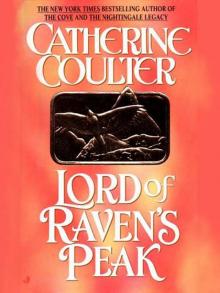 Lord of Raven's Peak
Lord of Raven's Peak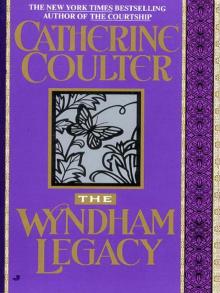 The Wyndham Legacy
The Wyndham Legacy The Strange Visitation at Wolffe Hall
The Strange Visitation at Wolffe Hall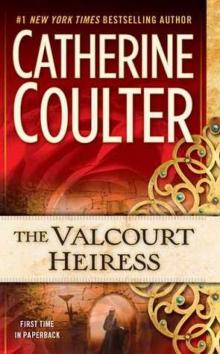 The Valcourt Heiress
The Valcourt Heiress Bombshell
Bombshell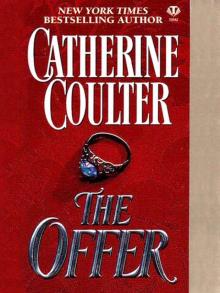 The Offer
The Offer The Edge
The Edge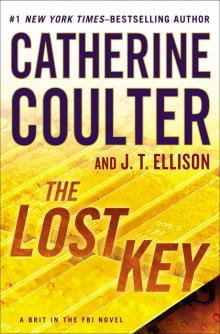 The Lost Key
The Lost Key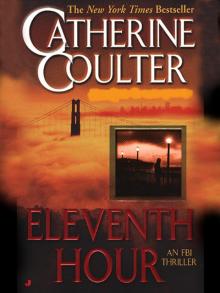 Eleventh Hour
Eleventh Hour Blindside
Blindside Devil's Daughter
Devil's Daughter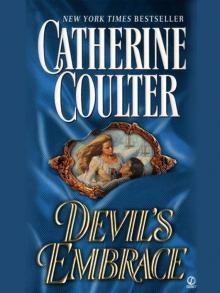 Devil's Embrace
Devil's Embrace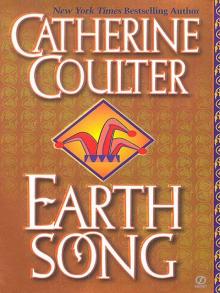 Earth Song
Earth Song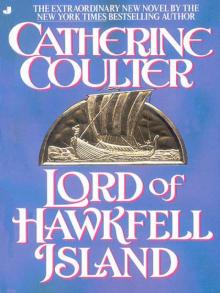 Lord of Hawkfell Island
Lord of Hawkfell Island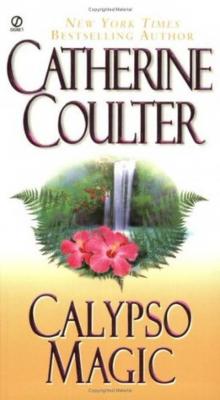 Calypso Magic
Calypso Magic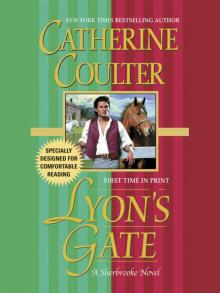 Lyon's Gate
Lyon's Gate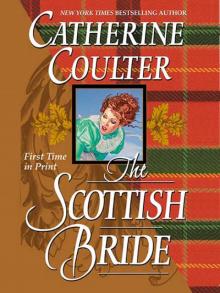 The Scottish Bride
The Scottish Bride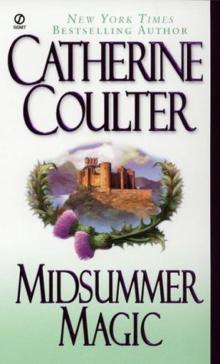 Midsummer Magic
Midsummer Magic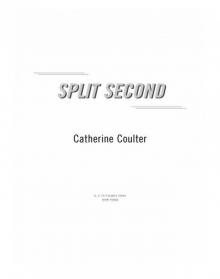 Split Second
Split Second Enigma
Enigma Blowout
Blowout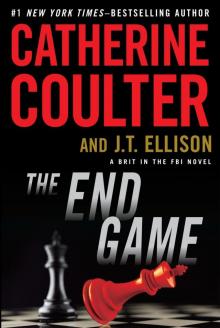 The End Game
The End Game Double Take
Double Take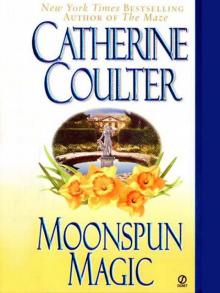 Moonspun Magic
Moonspun Magic The Courtship
The Courtship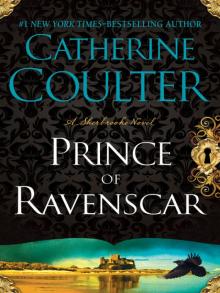 Prince of Ravenscar
Prince of Ravenscar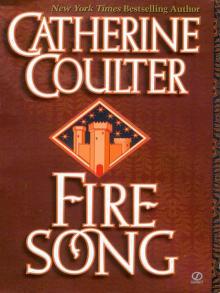 Fire Song
Fire Song Wizard's Daughter
Wizard's Daughter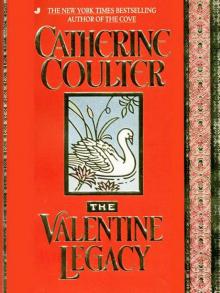 The Valentine Legacy
The Valentine Legacy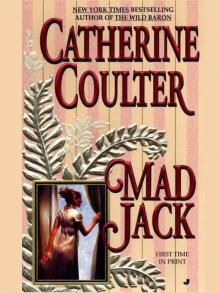 Mad Jack
Mad Jack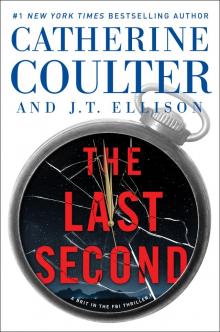 The Last Second
The Last Second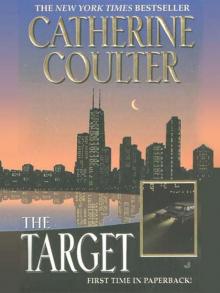 The Target
The Target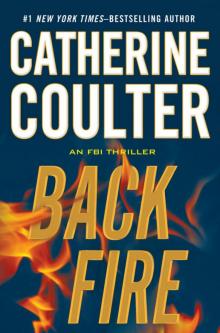 Backfire
Backfire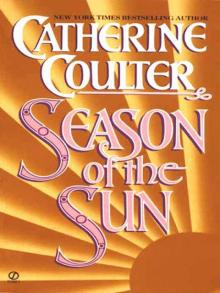 Season of the Sun
Season of the Sun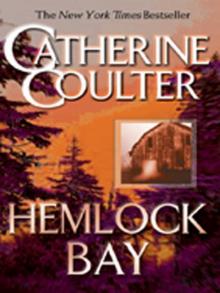 Hemlock Bay
Hemlock Bay Insidious
Insidious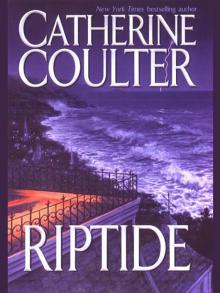 Riptide
Riptide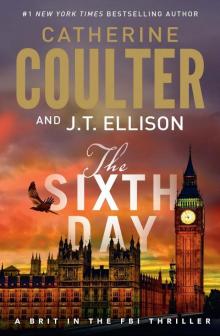 The Sixth Day
The Sixth Day Secret Song
Secret Song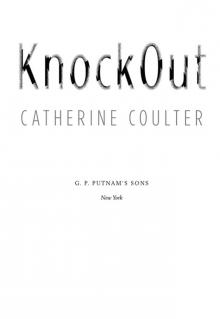 KnockOut
KnockOut Jade Star
Jade Star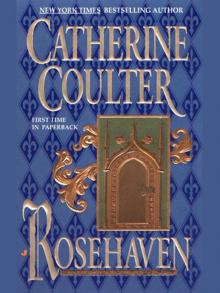 Rosehaven
Rosehaven The Hellion Bride
The Hellion Bride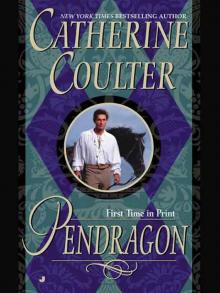 Pendragon
Pendragon Vortex
Vortex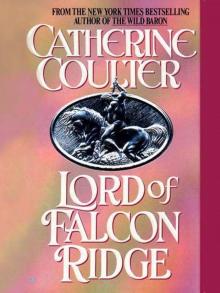 Lord of Falcon Ridge
Lord of Falcon Ridge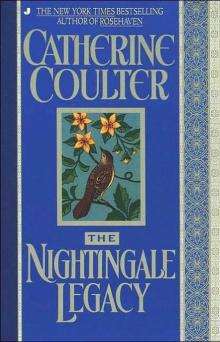 The Nightingale Legacy
The Nightingale Legacy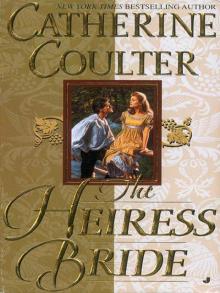 The Heiress Bride
The Heiress Bride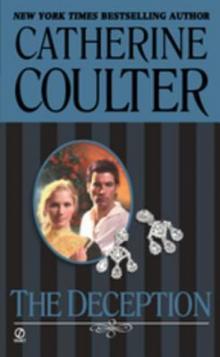 The Deception
The Deception The Maze
The Maze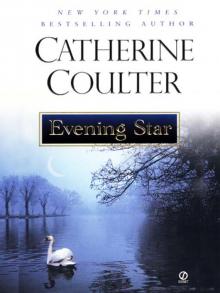 Evening Star
Evening Star Wild Star
Wild Star The Final Cut
The Final Cut Paradox
Paradox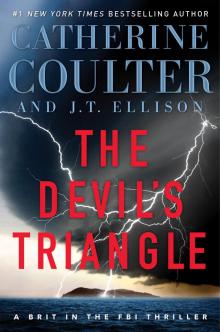 The Devil's Triangle
The Devil's Triangle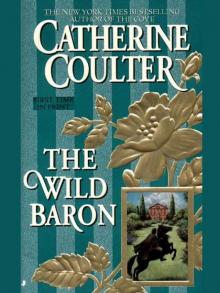 The Wild Baron
The Wild Baron Point Blank
Point Blank Labyrinth
Labyrinth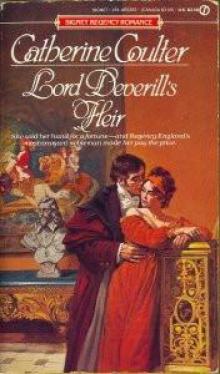 Lord Deverill's Heir
Lord Deverill's Heir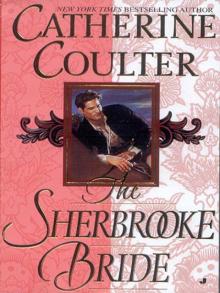 The Sherbrooke Bride
The Sherbrooke Bride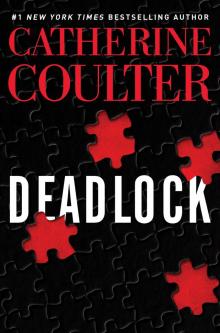 Deadlock
Deadlock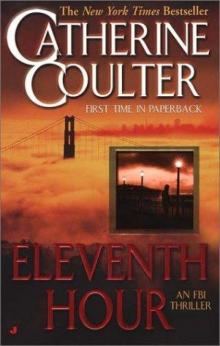 Eleventh Hour f-7
Eleventh Hour f-7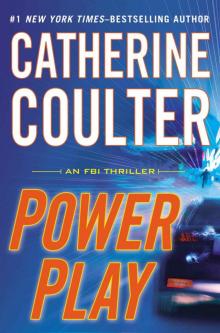 Power Play (An FBI Thriller)
Power Play (An FBI Thriller)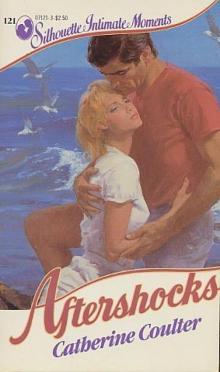 Aftershocks
Aftershocks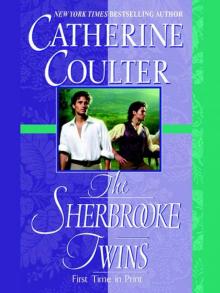 Sherbrooke Twins tb-8
Sherbrooke Twins tb-8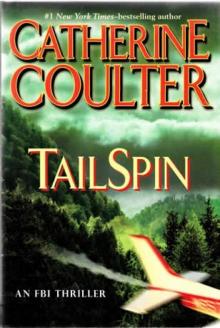 Tail Spin ft-12
Tail Spin ft-12 The FBI Thrillers Collection
The FBI Thrillers Collection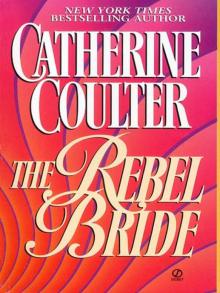 The Rebel Bride
The Rebel Bride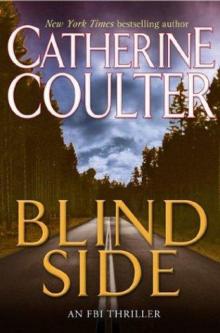 Blindside f-8
Blindside f-8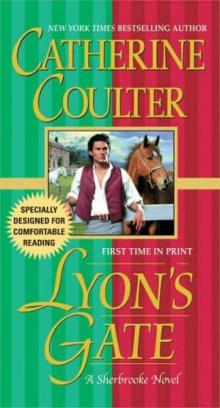 Lyons Gate tb-9
Lyons Gate tb-9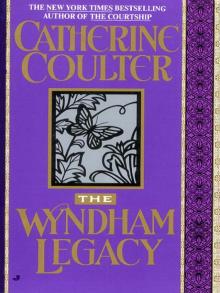 Wyndham Legacy
Wyndham Legacy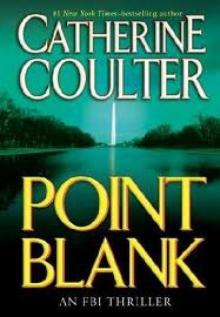 Point Blank f-10
Point Blank f-10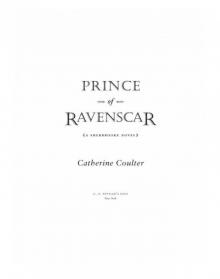 The Prince of Ravenscar
The Prince of Ravenscar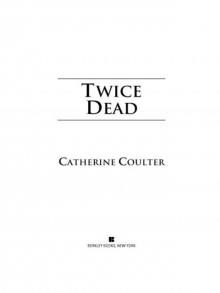 Twice Dead
Twice Dead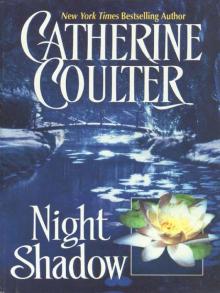 Night Shadow
Night Shadow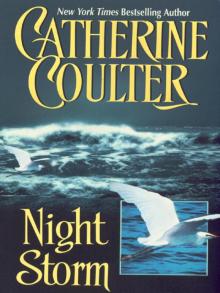 Night Storm
Night Storm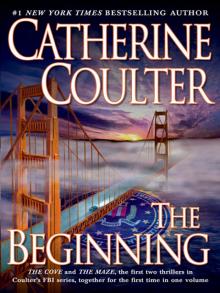 The Beginning
The Beginning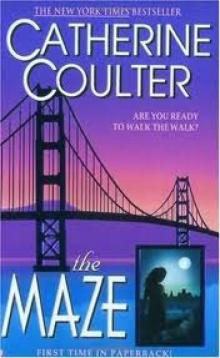 The Maze ft-2
The Maze ft-2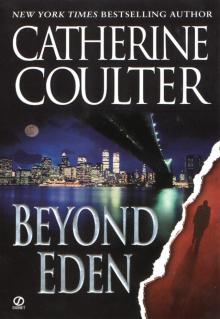 Beyond Eden
Beyond Eden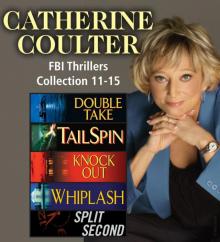 The FBI Thrillers Collection: Vol 11-15
The FBI Thrillers Collection: Vol 11-15 FALSE PRETENSES
FALSE PRETENSES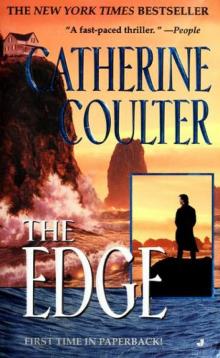 The Edge f-4
The Edge f-4 Bombshell (AN FBI THRILLER)
Bombshell (AN FBI THRILLER) The Ancient Spirits of Sedgwick House (Grayson Sherbrooke's Otherworldly Adventures Book 3)
The Ancient Spirits of Sedgwick House (Grayson Sherbrooke's Otherworldly Adventures Book 3)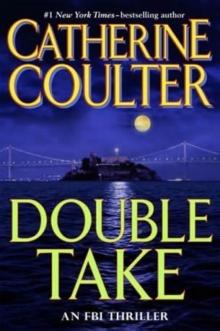 Double Take ft-11
Double Take ft-11 The Heir
The Heir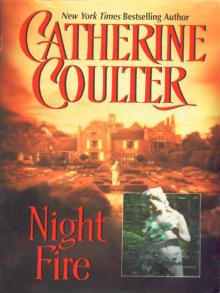 Night Fire
Night Fire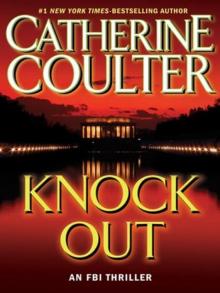 KnockOut ft-13
KnockOut ft-13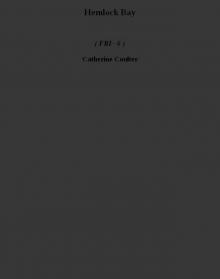 Hemlock Bay f-6
Hemlock Bay f-6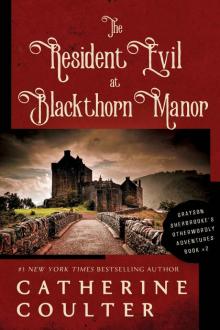 The Resident Evil at Blackthorn Manor (Kindle Single) (Grayson Sherbrooke's Otherworldly Adventures Book 2)
The Resident Evil at Blackthorn Manor (Kindle Single) (Grayson Sherbrooke's Otherworldly Adventures Book 2)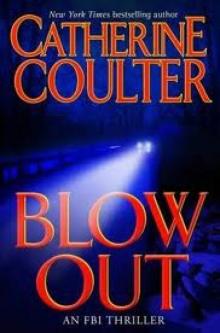 Blowout ft-9
Blowout ft-9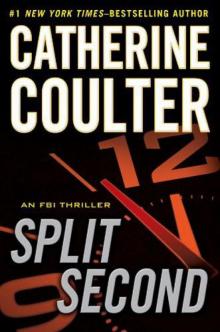 Split Second f-15
Split Second f-15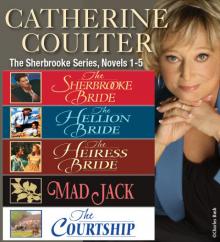 The Sherbrooke Series Novels 1-5
The Sherbrooke Series Novels 1-5 Impulse
Impulse Paradox (An FBI Thriller Book 22)
Paradox (An FBI Thriller Book 22)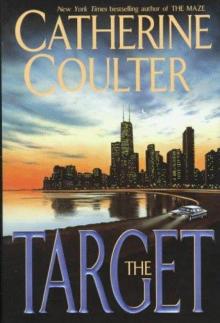 The Target f-3
The Target f-3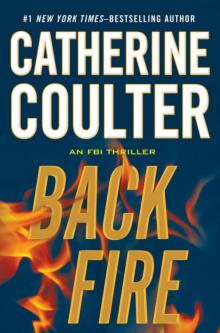 Backfire fst-16
Backfire fst-16 Born To Be Wild
Born To Be Wild Wizards Daughter tb-10
Wizards Daughter tb-10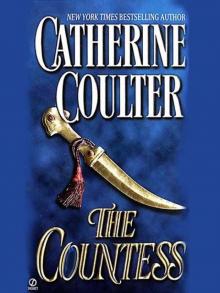 The Countess
The Countess